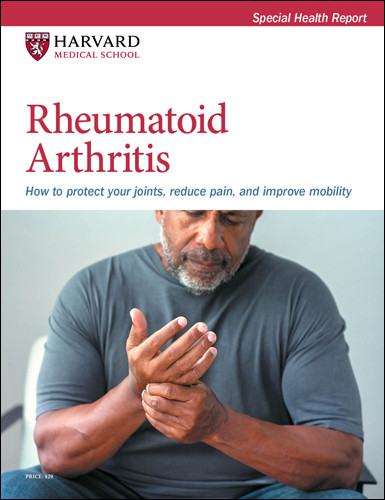Is it possible to prevent arthritis?
On call
- Reviewed by Howard E. LeWine, MD, Chief Medical Editor, Harvard Health Publishing; Editorial Advisory Board Member, Harvard Health Publishing

Q. So many of my relatives and friends have arthritis. I have been fortunate so far. Is there any proven way to prevent it?
A. You may be able to lower your risk for three of the most common types of arthritis: osteoarthritis, rheumatoid arthritis, and gout. Here's a brief description of each and how to possibly prevent them.
Osteoarthritis, the most common type, occurs when the cartilage of a joint erodes (breaks down). Bones begin to rub against each other, causing pain and difficulty moving the joint. It's also the most common reason for knee and hip replacements. Take these steps to lower your risk:
- Maintain a healthy weight. Osteoarthritis becomes more common with age and tends to run in families. But millions of cases might be prevented by avoiding excessive weight gain.
- Avoid trauma. Injury also increases the risk of osteoarthritis. Some ways to avoid injury include exercising regularly, doing resistance training, and not taking unnecessary risks at work or at play.
- Prevent and treat conditions that might contribute to joint damage like gout (see below) or an infection.
Rheumatoid arthritis is a chronic inflammatory disease that causes pain, stiffness, warmth, redness, and swelling in joints. Over time, the affected joints may become misshapen, misaligned, and damaged. Rheumatoid arthritis usually occurs in a symmetrical pattern, meaning that if one knee or hand has it, the other usually does, too. Ways to reduce your risk of rheumatoid arthritis include avoiding tobacco and improving your oral health. Gum inflammation (gingivitis) caused by certain bacteria has been linked to many health conditions, including rheumatoid arthritis. Good oral hygiene and regular dental care may lower the risk.
Gout occurs when crystals of uric acid get deposited in one or more joints and trigger inflammation that causes pain, swelling, and redness. You can reduce your risk by doing the following:
- Eat a healthy diet. Avoid any foods that seem to trigger gout attacks, such as liver and sweetbreads. A heart-healthy diet such as the Mediterranean diet may reduce the risk of gout in some people.
- Limit alcohol. Stick to no more than one drink per day, and avoid binge drinking.
- Stay well hydrated.
- Lose weight if you are overweight or obese.
- Avoid diuretics (water pills) if possible (but discuss all medication changes with your doctor).
If you notice joint pain, joint swelling, or difficulty doing activities, see your doctor. Early diagnosis and treatment can make a big difference in your future joint health.
Image: © Jose Luis Pelaez/Getty Images
About the Author

Matthew Solan, Former Executive Editor, Harvard Men's Health Watch
About the Reviewer

Howard E. LeWine, MD, Chief Medical Editor, Harvard Health Publishing; Editorial Advisory Board Member, Harvard Health Publishing
Disclaimer:
As a service to our readers, Harvard Health Publishing provides access to our library of archived content. Please note the date of last review or update on all articles.
No content on this site, regardless of date, should ever be used as a substitute for direct medical advice from your doctor or other qualified clinician.
















